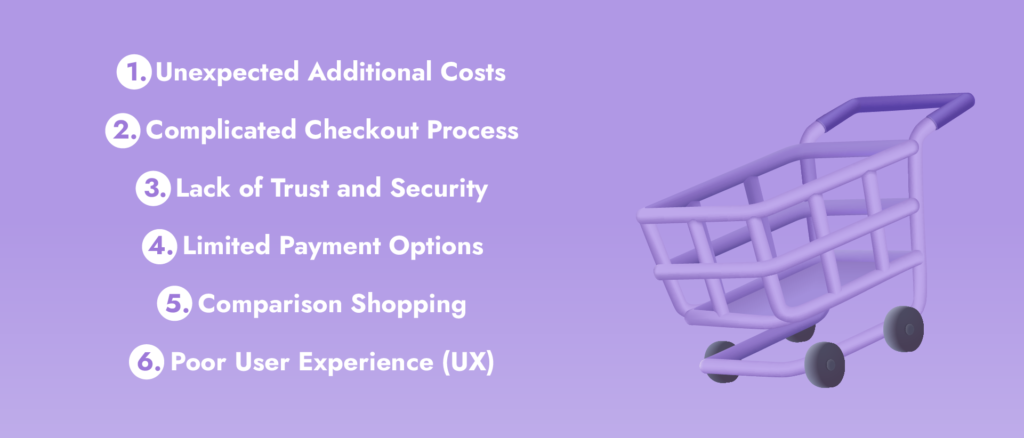Shopping cart abandonment has become a persistent issue for online retailers in recent years. It refers to the phenomenon where potential customers add items to their online shopping carts but leave the website without completing the purchase.
The typical rate of shopping cart abandonment stands at 69.99%. This trend has been a cause of concern for retailers due to its impact on their sales and overall revenue. In this blog post, we will explore the reasons behind shopping cart abandonment and discuss some actionable solutions for retailers to tackle this problem effectively.
Why is Shopping Cart Abandonment a Problem for Retailers?
A high shopping cart abandonment rate can be alarming for online retailers. It signifies missed sales opportunities and potential revenue loss. When customers abandon their shopping carts, it means that they were interested in the products or services offered by the retailer, but something stopped them from completing the purchase. Understanding the reasons behind cart abandonment is crucial for retailers to address the underlying issues and optimize their conversion rates.
Reasons for Shopping Cart Abandonment
- Unexpected Additional Costs: One of the primary reasons customers abandon their shopping carts is the sudden appearance of hidden costs during the checkout process. These additional costs can include shipping fees, taxes, or processing charges. When customers are confronted with unexpected expenses, they may reconsider their purchase decision and opt to abandon the cart instead.
- Complicated Checkout Process: A lengthy or complex checkout procedure is another factor contributing to cart abandonment. Customers appreciate simplicity and convenience when making online purchases. If the checkout process involves excessive form filling, multiple steps, or account creation requirements, it can lead to frustration and impede the completion of the purchase.
- Lack of Trust and Security: Trust and security are paramount for online shoppers. If customers have concerns about the security of their personal information or doubts regarding the credibility of the website, they may hesitate to proceed with the purchase. Retailers must prioritize the implementation of robust security measures and provide clear assurances to alleviate any apprehensions customers may have.
- Limited Payment Options: Offering limited payment options can also contribute to cart abandonment. Customers have different preferences when it comes to payment methods. By restricting the available options to only a few, retailers risk alienating potential buyers who prefer alternative payment methods such as digital wallets or specific payment platforms.
- Comparison Shopping: The convenience of online shopping allows customers to easily compare prices and products across different websites. As a result, customers often use online shopping carts as a means to compare prices and save items for future reference. If they find a better deal or a more appealing product elsewhere, they may abandon their cart on one website and proceed with the purchase on another.
- Poor User Experience (UX): A website with a subpar user experience, including slow loading times, unresponsive design, confusing navigation, or poor mobile optimization, can frustrate users and lead to cart abandonment. A smooth and seamless user experience throughout the shopping process is crucial for encouraging customers to complete their purchases.

Solutions to Reduce Cart Abandonment Rate
- a. Transparent Pricing: To combat unexpected costs, retailers should aim for transparency in pricing. Display all costs associated with the purchase, including taxes, shipping fees, and any additional charges, upfront. This will help customers make informed decisions and minimize the likelihood of abandoning their carts due to cost-related surprises.
- b. Simplify Checkout Process: Streamlining the checkout process is crucial for reducing cart abandonment. Retailers should aim to minimize the number of steps required to complete a purchase. Implementing guest checkout options, allowing social media login options, and pre-filling forms with stored customer information can significantly reduce friction and save customers’ time.
- c. Enhance Trust and Security: Building trust with customers is essential. Retailers can display trust badges, security certifications, and customer testimonials to establish credibility and assure customers of the safety of their personal information. Transparent privacy policies and secure payment gateways also play a vital role in enhancing trust.
- d. Offer Multiple Payment Options: To cater to a wider range of customer preferences, retailers should provide a variety of payment options. Alongside traditional credit cards, offering digital wallets like PayPal, Google Pay, or Apple Pay, as well as alternative payment methods, can accommodate different customer preferences and minimize the likelihood of cart abandonment.
- e. Implement Exit-Intent Pop-ups: Exit-intent pop-ups are a proactive approach to cart abandonment. These pop-ups are triggered when customers are about to leave the website without completing their purchase. By offering personalized discounts, free shipping, or other incentives through these pop-ups, retailers can entice customers to reconsider and complete their purchase.
- f. Optimize Web Design and Performance: To address poor user experience, retailers should focus on optimizing their website design and performance. This includes ensuring fast page load times, responsive design for mobile devices, and intuitive navigation, among other improvements. Conducting user testing and gathering feedback can help identify pain points and areas for improvement. It’s worth noting that in certain cases, a comprehensive website redesign may be necessary. By enhancing the overall usability and responsiveness of the website, retailers can provide a seamless and enjoyable shopping experience, reducing the likelihood of cart abandonment.
The Role of Remarketing in Cart Abandonment
Remarketing plays a vital role in addressing the issue of shopping cart abandonment. By leveraging effective remarketing strategies, retailers can re-engage with customers who have abandoned their carts and encourage them to complete their purchase. Here’s a closer look at the role of remarketing and the strategies involved:
Exploring the Effectiveness of Remarketing Strategies
- Remarketing involves targeting customers who have shown interest in a retailer’s products or services but have not completed their purchase.
- By staying top-of-mind and re-engaging with these customers, retailers have an opportunity to recover lost sales and improve conversion rates.
Implementing Personalized Email Campaigns and Targeted Ads
- Personalized email campaigns are a powerful remarketing tool. Retailers can send customized emails to customers who have abandoned their carts, reminding them about the items left behind.
- These emails can include tailored recommendations, enticing visuals, and clear calls to action, urging customers to return to their carts and complete their purchase.
- Similarly, targeted ads on various platforms, such as social media or display networks, can reach customers who have abandoned their carts and remind them about the items they were interested in.
Showcasing Special Offers, Discounts, or Incentives
- To entice customers to return and complete their purchase, retailers can offer special promotions, discounts, or incentives.
- These offers can include exclusive discounts on the abandoned items, free shipping, or limited-time offers to create a sense of urgency.
- By showcasing these incentives in remarketing emails or ads, retailers can motivate customers to revisit their carts and finalize their transaction.
The effectiveness of remarketing lies in its ability to remind customers about their abandoned items, address any concerns or hesitations they may have had, and provide additional incentives to encourage them to take action. By implementing personalized email campaigns, targeted ads, and special offers, retailers can significantly improve their chances of recapturing lost sales and reducing cart abandonment rates.
Continuous Optimization and Testing
Reducing shopping cart abandonment requires ongoing optimization and testing. Retailers should continuously monitor and analyze cart abandonment data to identify patterns and trends. A/B testing different strategies, such as checkout process modifications or pricing experiments, can help determine the most effective approaches to reduce cart abandonment rates. By constantly striving to improve the user experience, retailers can better understand their customers’ needs and preferences, leading to higher conversion rates and increased sales.
In conclusion, shopping cart abandonment poses a significant challenge for online retailers. By understanding the reasons behind cart abandonment and implementing actionable solutions, retailers can improve their conversion rates, enhance the overall shopping experience, and maximize their sales potential. The key lies in providing a seamless and transparent checkout process that instills trust, offers flexibility, and addresses customers’ concerns. With a proactive approach and continuous optimization, retailers can successfully combat shopping cart abandonment and drive their business towards greater success.




